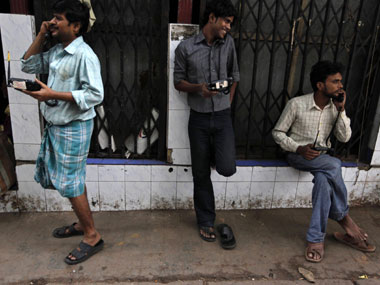New Delhi: Last month, Communications Minister Kapil Sibal said that 3G services have not been as successful as 2G in India because telcos had paid “such huge prices” for the spectrum that there is “no liquidity in the market for them to invest in the infrastructure and the devices to deliver 3G.” This was why 2G was successful and 3G was not.
But if what the Telecom Regulatory Authority of India (Trai) is now proposing on spectrum is accepted, 3G services would take a further knock. The regulator’s insistence on refarming spectrum in the 800 and 900 Mhz bands could make it tougher for telcos to offer better 3G services.
[caption id=“attachment_290744” align=“alignleft” width=“380” caption=“Trai has emphasised 900 Mhz and 800 Mhz spectrum should be reauctioned once the old licences expire, and analysts believe this will create artificial spectrum scarcity, ultimately hitting 3G services. Reuters”]
 [/caption]
[/caption]
Here’s how: Trai has emphasised 900 Mhz and 800 Mhz spectrum should be reauctioned once the old licences expire, and analysts believe this will create artificial spectrum scarcity, ultimately hitting 3G services.
The golden goose, which enabled the government to raise over Rs 1,06,000 crore from 3G and BWA auctions in 2012, is on the sickbed.
“Refarming can only happen in stages; it will take along time to complete - 10 years at least - since licences expire in stages (except in the four metros, where they expire in 2014) and for CDMA players it could mean up to 2023. This means a lot of useful spectrum is blocked from the market, like the 2100 Mhz band (which is used for 3G), which could have immediately contributed to an increase in mobile broadband penetration,” said a mobile technology player.
Impact Shorts
More ShortsHe said this will kill the 3G market, which is already suffering because of fragmented and limited spectrum availability. As of now, except the public sector BSNL, no 3G operator has a pan-India licence. Bharti Airtel has 13 circles, Vodafone 9, Idea 11 and Tata Teleservices 9 circles. Also, the Department of Telecom (DoT) is against roaming or spectrum sharing by telcos, which means 3G penetration will suffer further.
Mahesh Uppal, a telecom consultant, said that the net consequence of Trai’s recommendations is that the “3G ecosystem will be badly damaged. Net spectrum available for 3G had reduced considerably”.
A leading 3G operator pointed out that though the new spectrum policy is technology agnostic - meaning even 2G spectrum, which comes up for bidding this year, can be used to offer 3G services - the capex needed to bid for and deploy this spectrum will be so expensive that services will ultimately suffer.
3G services are already impacting telcos’ bottomlines. In its results declared on Thursday, Idea Cellular attributed the slide in net profit to higher depreciation and interest charges because of front-loaded 3G investments. While depreciation rose to Rs 784.4 crore (Rs 657.2 crore), interest and financing cost jumped to Rs 227.5 crore from Rs 85.4 crore in the same period last year.
Kunal Bajaj of research firm Analysys Mason says 3G services will suffer because telcos will deploy a lot of capital in taking care of regulatory issues. “Excess spectrum held by them has to be paid for at the higher base price and this high base price will get justified even if one player successfully bids for spectrum in the fresh round of auctions. On top of that, refarming also has to happen. If operators have to return some spectrum under refarming and migrate to another spectrum band, this will require re-engineering of network plans and, therefore, significant investments”.
)